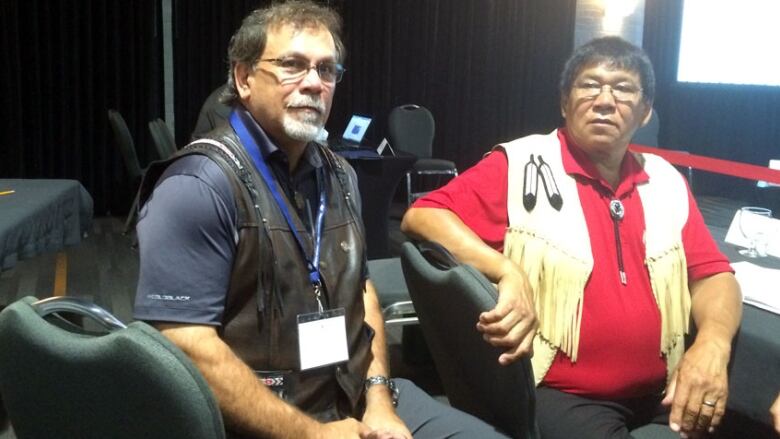Energy East pipeline requires First Nations consent, interveners tell NEB
TransCanada will 'strive to reach consent,' and avoid, mitigate any potential effects, VP tells public hearing

TransCanada Corp. says it will "strive to reach consent" with First Nations over the proposed Energy East pipeline.
John Van der Put, vice-president of eastern oil pipeline projects for the company, made the statement Wednesday in Saint John, during the third day of public hearings being held by the National Energy Board.
Several First Nations groups appeared as interveners, including Esgenoôpetitj First Nation Chief Alvery Paul, who asked Van der Put whether TransCanada recognizes the need for their consent.
First Nations in the Maritimes signed peace and friendship treaties, but did not cede their lands to the Crown, as was done in other parts of the country.
- Canaport LNG raises concerns about ship traffic from Energy East
- TransCanada Energy East pipeline jobs, safety focus of public hearings
"Energy East respects the legal and constitutional rights of aboriginal communities. And we are operating under the current Canadian law with respect to how we are governing our engagement with Aboriginal people. And we'll continue to do so," said Van der Put.
"Energy East will strive to reach consent with First Nations and also seek to avoid and mitigate any potential effects the project has on the community and that's how we will continue to operate."
A three-member NEB panel, tasked with deciding the fate of the controversial proposal that would see Alberta crude shipped 4,500 kilometres to a marine terminal in Saint John, is holding public hearings across the country.
'Fighting for our survival'
Each First Nations speaker Wednesday greeted the NEB members the same way, welcoming them to "unceded lands."
"Our peace and friendship treaties did not surrender our Aboriginal title to our lands," stressed George Ginnish, chief of Mi'gmawe'l Tplu'tagnn Inc. (formerly known as the Assembly of First Nations Chiefs) and the chief of Eel Ground First Nation.
"The Energy East pipeline will cross through our unceded Mi'qmaq traditional lands, which we hold Aboriginal title to. Thus the project will require our consent," Ginnish said.
"Our relationship with the land, waters and resources is the foundation of our identity as First Nations people," he said.
Ginnish and others expressed concerns about the potential impact the proposed project would have on waterways and traditional fisheries. "Salmon are central to our being," he said. An oil spill would cause a "devastating" loss," he said.
Kenneth Francis of Elsipogtog First Nation told the panel the proposed pipeline attacks their humanness. "We are fighting for our survival," he said.
Fundy fisheries concerns
Maria Recchia, of the Fundy North Fishermen's Association, accused TransCanada of underrepresenting the impact the project would have on the Bay of Fundy fishery.
She alleges the Calgary-based company is not properly representing the number of boats fishing in the sea lanes off Saint John.
"They're trying to make the case that the only fishermen impacted are the six boats that fish out of Mispec, which mostly fish inshore," said Recchia. She contends the number of boats that use the area is closer to 75.
The concerns include loss of gear, product and opportunity in an area that could soon be busy with supertankers, tugs, pilot and service boats, she said.
Recchia asked TransCanada to release the studies it's using, but company officials would not commit on Wednesday.
Recchia asked the NEB to order the release, but the panel declined to make an immediate decision on the matter.

Darling said he has received phone calls from people asking him "to be a much bigger cheerleader" of the project. "They wanted me, as mayor, to really be 100 per cent behind this project and start screaming that very loudly."
We're not saying we're against it and we're not saying we're 100 per cent for it.- Don Darling, Saint John mayor
"Let me be absolutely clear, I recognize the importance of this project and the opportunities of this project to Saint John" and council has conditionally supported the project, based on being satisfied with its "due diligence."
"We're not saying we're against it and we're not saying we're 100 per cent for it; we're saying we have a job to do and we have many questions to ask and receive answers for and once we've heard all of the answers that TransCanada makes, we'll make an informed decision," he said.
Darling said he appreciated the NEB beginning its series of public consultations in Saint John.
"We believe we are most certainly the municipality with the most at stake here in terms of the components of the Energy East project, but also, you know, we feel economically there should be real benefits received to this community from this project."
The public hearings are scheduled to continue in Fredericton on Monday and Tuesday at the Crowne Plaza Lord Beaverbrook Hotel.
The regulator is scheduled to hear from 337 interveners in visits to nine cities that conclude in Kingston, Ont., in December.
The NEB is to give the federal government its report by March 16, 2018.
With files from Connell Smith and Information Morning Saint John